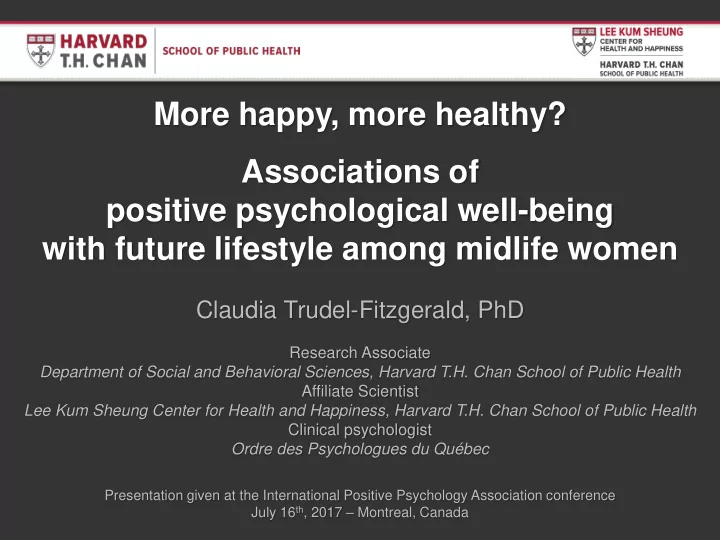

More happy, more healthy? Associations of positive psychological well-being with future lifestyle among midlife women Claudia Trudel-Fitzgerald, PhD Research Associate Department of Social and Behavioral Sciences, Harvard T.H. Chan School of Public Health Affiliate Scientist Lee Kum Sheung Center for Health and Happiness, Harvard T.H. Chan School of Public Health Clinical psychologist Ordre des Psychologues du Québec Presentation given at the International Positive Psychology Association conference July 16 th , 2017 – Montreal, Canada
Positive Psychological Well-Being & Health Disease outcomes CVD Diabetes Hypertension Mortality All-cause CVD-related Ameringer et al., 2015; Boehm & Kubzansky, 2012; Boehm et al., 2015; Hingle et al., 2014; Kim et al., 2016; Martin-Maria et al., 2016; Rasmussen et al., 2009; Sin, 2016; Steptoe et al., 2009; Trudel-Fitzgerald et al., 2014/2015
Methods Women from the Nurses’ Health Study cohort, free of chronic disease Baseline Health Health Health Health Health Health Health Baseline happiness behaviors behaviors behaviors behaviors behaviors behaviors behaviors optimism 1992 1994 (T2) 1998 (T3) 2002 (T4) 2006 (T5) 2006 (T1) 2010 (T6) 2010 (T2) 2004 Lifestyle: Lifestyle: 1 item: 6 items (LOT-R): Physical activity “ How much of Physical activity e.g., “In uncertain Diet Diet the time during times I usually Alcohol intake Alcohol intake the past 4 weeks expect the best” Smoking Smoking have you been a BMI happy person? ” BMI 6 years of follow-up; N optimism = 36,799 18 years of follow-up; N happiness = 52,070
Results Logistic regression models Inverse probability weights to account for bias due to differential drop out Adjustment for age, education, marital status, physical exam in the last 2 years Optimism Happiness Continuous Dichotomized Continuous Dichotomized (High vs. (High vs. (1 SD) (1 SD) moderate or low) moderate or low) Sample size 36,799 36,799 52,070 52,070 (women with ≥ 1 healthy lifestyle (16,130) (16,130) (31,609) (31,609) over the course of follow-up) Odds Ratio 1.18**** 1.33**** 1.14**** 1.29**** (95% CI) (1.16-1.21) (1.28-1.38) (1.12-1.16) (1.25-1.34) * p ≤0.05, ** p ≤0.01, *** p ≤0.001, **** p ≤0.0001; SD=standard deviation; CI=confidence intervals.
Discussion Positive psychological well-being is related to a greater likelihood of ever reporting a healthy lifestyle over a period of 6 to 18 years Higher (vs. moderate/low) happiness = 29% Higher (vs. moderate/low) optimism = 33% For each 1-SD increase as well Relationships remained robust after adjusting for traditional confounders and psychological distress regardless of women’s baseline set of health behaviors However, results cannot be generalized to midlife women with a chronic medical condition younger women, men, or minorities Future directions Investigate other psychological well-being dimensions with subsequent lifestyle Verify whether increasing well-being truly improves lifestyle in clinical studies
Acknowledgements Co-authors Julia K. Boehm, PhD Shelley S. Tworoger, PhD Laura D. Kubzansky, PhD, MPH Participants and staff of the Nurses’ Health Study cohort Related institutions Harvard T.H. Chan School of Public Health Harvard Medical School Brigham and Women’s Hospital Lee Kum Sheung Center for Health and Happiness Financial support Lee Kum Sheung Center for Health and Happiness (Harvard School of Public Health) Canadian Institute of Health Research Fonds de Recherche du Québec – Santé
Questions? ctrudel@hsph.harvard.edu Thank you!
Selected references Ameringer, K. J., Chou, C. P., & Leventhal, A. M. (2015). Shared versus specific features of psychological symptoms and cigarettes per day: Structural relations and mediation by negative- and positive-reinforcement smoking. Journal of Behavioral Medicine, 38(2), 224-236. Boehm, J. K., & Kubzansky, L. D. (2012). The heart's content: The association between positive psychological well-being and cardiovascular health. Psychological Bulletin, 138(4), 655-691. Boehm, J. K., Trudel-Fitzgerald, C., Kivimaki, M., & Kubzansky, L. D. (2015). The prospective association between positive psychological well-being and diabetes. Health Psychology , 34(10), 1013-1021. Hingle, M. D., Wertheim, B. C., Tindle, H. A., Tinker, L., Seguin, R. A., Rosal, M. C., et al. (2014). Optimism and diet quality in the Women's Health Initiative. J Acad Nutr Diet , 114(7), 1036-1045. Kim, E. S., Kubzansky, L. D., Soo, J., & Boehm, J. K. (2016). Maintaining healthy behavior: A prospective study of psychological well-being and physical activity. Annals of Behavioral Medicine. Martin-Maria, N., Miret, M., Caballero, F. F., Rico-Uribe, L. A., Steptoe, A., Chatterji, S., et al. (2017). The impact of subjective well-being on mortality: A meta-analysis of longitudinal studies in the general population. Psychosomatic Medicine. Rasmussen, H. N., Scheier, M. F., & Greenhouse, J. B. (2009). Optimism and physical health: A meta-analytic review. Annals of Behavioral Medicine, 37(3), 239-256. Sin, N. L. (2016). The protective role of positive well-being in cardiovascular disease: Review of current evidence, mechanisms, and clinical implications. Current Cardiology Reports, 18(11), 106. Steptoe, A., Dockray, S., & Wardle, J. (2009). Positive affect and psychobiological processes relevant to health. Journal of Personality, 77(6), 1747-1776. Trudel-Fitzgerald, C., Boehm, J. K., Kivimaki, M., & Kubzansky, L. D. (2014). Taking the tension out of hypertension: a prospective study of psychological well being and hypertension. Journal of Hypertenssion, 32(6), 1222-1228. Trudel-Fitzgerald, C., Gilsanz, P., Mittleman, M. A., & Kubzansky, L. D. (2015). Dysregulated blood pressure: Can regulating emotions help? Current Hypertension Reports, 17(12), 92.
Recommend
More recommend